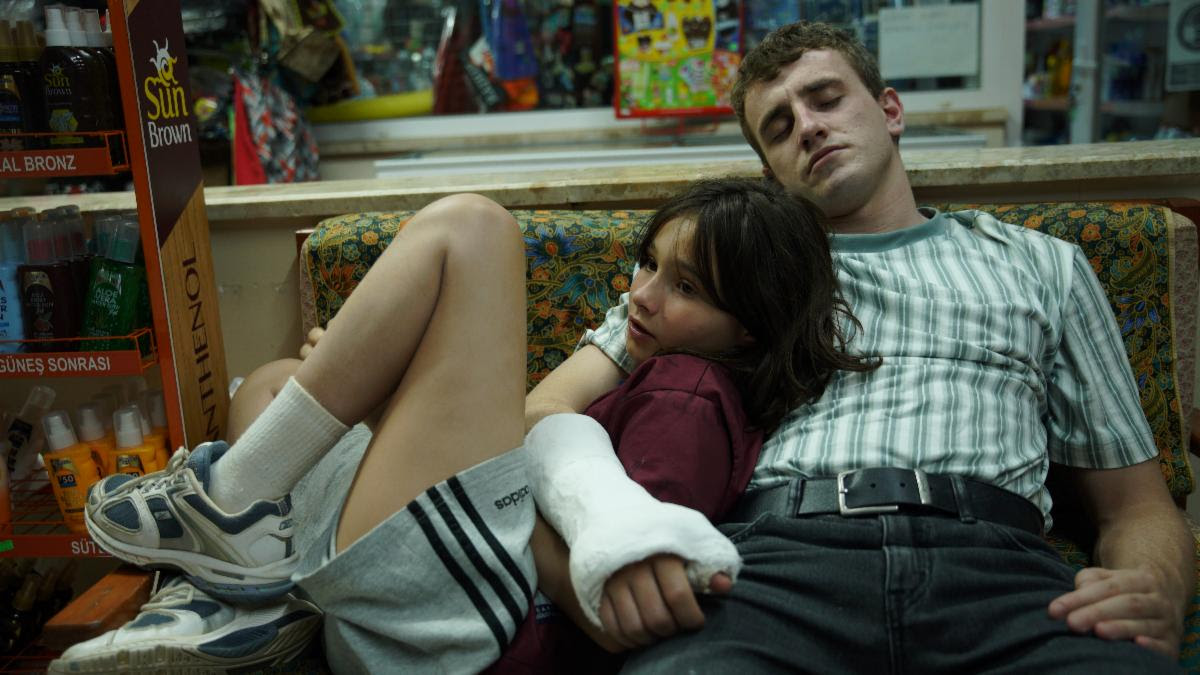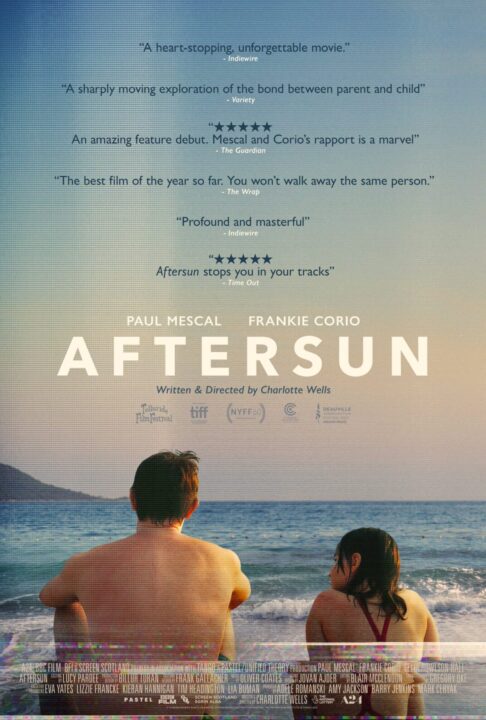There is a heartbreaking recognition that Aftersun confronts us with: even the best moments of our lives are temporary. Eventually, they will pass and become memories.
Aftersun takes place during a week-long vacation between Sophie (Frankie Corio) and her young dad, Calum (Paul Mescal). Set in a sunny Turkish beach town (more specifically, at a modest resort that the young dad can afford), Aftersun shows the simple yet important moments that also suggest the start of a pivotal time of coming-of-age.
The small, overlooked moments between parent and child–such as having your sunscreen rubbed in at the pool, lazily hanging around the hotel room, and snickering together throughout cheesy dinner shows–are rendered with incredible observation and an authentic heart that is emotionally moving.
The entirety of the film is naturalistic, unflashy, and full of warmth, due in large part to the nostalgia of the ’90s time period. We return to the pre-cell phone, pre-digital distraction age (of which my own childhood vacations also took place).
The special bond that Sophie and Calum have can unmistakably be attributed to their shared youth. She’s eleven, he’s thirty-ish–somewhere between a child and an adult himself (his arm cast might imply that he too might still have some growing up to do). Sophie’s young maturity and Calum’s natural playfulness create an incredibly close relationship. They are each other’s worlds.
However, through subtle storytelling, we soon feel a psychic disturbance that this idyllic vacation may be covering a deeper conflict. Early on, Sophie grimaces while seeing Calum’s “weird ninja moves,” but his Tai Chi practice–photographed more saddeningly later on–suggests that he’s struggling to tamp down an inner conflict that Sophie isn’t aware of, and too young to be to understand anyways.
As days pass and the vacation starts to reach its inevitable end, Calum–as if anticipating something we’re not aware of–becomes increasingly unsteady. We’re left hoping for the best despite the red flags, but the optimism is hard to sustain, especially in the film’s final shot. I’ll proceed without going into further detail, as I found that Aftersun‘s emotional impact comes from the slow reveals.
Bringing this story to the screen is first-time feature filmmaker Charlotte Wells. This directorial debut is such an impressive accomplishment, as it’s easily one of my favorite films of the year. Wells’ natural ability to capture and realize profoundly small moments also makes sense when you consider that Aftersun was inspired by her own childhood. The act of rendering a troubled past onto the big screen reminded me of Johanna Hogg’s The Souvenir, another emotionally wrought and devastatingly personal film.
One of the best parts of the film is Wells’ choice to weave in the recorded home video footage that Sophie takes throughout the trip. The grainy, shaky handheld footage of Sophie–face covering the screen–makes for a sense of present and past all at once; as if we’re both experiencing their vacation in real-time, as well as watching it as a memory.
As Sophie gets ready to board the plane back home to stay with her mother, Calum uses his camcorder to capture the last few moments he has with his daughter. He records Sophie waving goodbye, and can’t help himself from rewinding, fast-forwarding, and replaying that moment as soon as she leaves his line of vision. It’s heartbreaking. There’s an ambiguousness to what might have happened following that.
Aftersun creates incredible depth in showing just how impactful the subtle moments between a parent and child can be. Understanding that although moments don’t last, no matter how badly we wish we could pause time, there is a sense of optimism when we realize that we’ll always have the ability to keep those memories alive.
1h 42min. ‘Aftersun’ is rated R for some language and brief sexual material.
Ryan Rojas
Ryan is the editorial manager of Cinemacy, which he co-runs with his older sister, Morgan. Ryan is a member of the Hollywood Critics Association. Ryan's favorite films include 2001: A Space Odyssey, The Social Network, and The Master.


